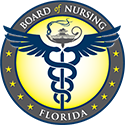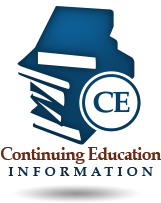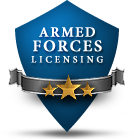Click on the appropriate tab below to see the Initial Licensing Requirements, Process, Fees, Statutes and Administrative Rules for a Licensed Practical Nurse & Registered Nurse by Endorsement.
For Licensure by Endorsement, the requirements are as follows and can be found in Section 464.009, F.S.:
Applicants are eligible for licensure by endorsement when they hold a valid license to practice professional or practical nursing in another state or territory of the United States obtained by one of the following measures.
Applicants are eligible for licensure by endorsement when they have successfully completed an approved or accredited nursing education program as required in Section 464.008, F.S. and the State Board Test Pool Examination (SBTPE) or the NCLEX.
OR
Applicants are eligible for licensure by endorsement when they have actively practiced nursing in another state, jurisdiction, or territory of the United States for 2 of the preceding 3 years without any criminal history or having his or her license acted against by the licensing authority of any jurisdiction.
An applicant who has not been in active practice of nursing within the past 5 years is required to take a remedial course as specified in Rule 64B9-3.0025, F.A.C., prior to licensure.
Applicants who are applying for multistate privileges and have graduated from a non-NCSBN jurisdiction, i.e. Puerto Rico or international nursing education program, must have, or have previously had, their education evaluated and determined equivalent to an approved program by the Board. It is acceptable to have confirmation provided by an exam state that this requirement was met at initial licensure. If the education evaluation indicates that the education was not completed in English, an English competency exam must also be completed. Please see NON-NCSBN/International Grads for approved credential evaluators and English competency providers.
Electronic Fingerprinting
Applicants for initial licensure must use a Livescan service provider to have their fingerprints submitted electronically to the Florida Department of Law Enforcement (FDLE) for conducting a search for any Florida and national criminal history records that may pertain to the applicant. The results will be returned to the Care Provider Background Screening Clearinghouse (Clearinghouse) and made available to the board office for consideration during the licensure process. The Livescan fingerprints submitted by the applicant will be retained by FDLE and the Clearinghouse. All costs for conducting a criminal history background screening are borne by the applicant. The Board of Nursing is no longer authorized by law to accept hard fingerprint cards or results from the applicant. All results must be submitted electronically from a Livescan service provider.
It is important to use the correct Originating Agency Identification (ORI) when submitting fingerprints. If you do not provide an ORI number or if you provide an incorrect ORI number to the service provider, the board office will not receive your fingerprint results.
Applicants who reside outside of the State of Florida must have their prints taken on a hard fingerprint card and contact an approved Livescan service provider who converts cards.
Applicants can use any FDLE approved Livescan service provider to submit their fingerprints. The applicant is fully responsible for selecting the service provider and ensuring the results are reported to the board office. For more information, FAQs, and a list of all approved Livescan service providers please visit the Background Screening website and click on the Livescan Service Providers tab. Please take the Nursing Electronic Fingerprint Form with you to the Livescan provider. Please check the service provider’s requirements to see if you need to bring any additional items. Please verify the ORI number submitted by the Livescan service provider matches the information provided by the Florida Board of Nursing.
Applicants with Health History
If a “Yes” response was provided to any of the questions in this section, provide the following documents directly to the board office:
A letter from a licensed health care practitioner, who is qualified by skill and training to address the condition identified, which explains the impact the condition may have on the ability to practice the profession with reasonable skill and safety. The letter must specify that the applicant is safe to practice the profession without restrictions or specifically indicate the restrictions that are necessary. Documentation provided must be dated within one year of the application date.
A written self-explanation, identifying the medical condition(s) or occurrence(s); and current status.
Applicants with Criminal History
Any applicant who has ever been found guilty of or pled guilty or no contest/nolo contendere to any charge other than a minor traffic offense must list each offense on the application. Failure to disclose criminal history may result in denial of your application. Each application is reviewed on its own merits.
Staff cannot make determinations in advance as laws and rules do change over time. Violent crimes and repeat offenders are required to be presented to the Board of Nursing for review. Evidence of rehabilitation is important to the board members when making licensure decisions.
Applicants with prior criminal convictions are required to submit the following documentation to the board:
Self-Explanation – Applicants who have listed offenses on the application must submit a letter in your own words describing the circumstances of the offense.
Final Dispositions/Arrest Records – Final disposition records for offenses can be obtained at the clerk of the court in the arresting jurisdiction. If the records are not available, you must have a letter on court letterhead sent from the clerk of the court attesting to their unavailability.
Completion of Probation/Parole/Sanctions – Probation and financial sanction records for offenses can be obtained at the clerk of the court in the arresting jurisdiction. Parole records for offenses can be obtained from the Department of Corrections or at the clerk of the court in the arresting jurisdiction. If the records are not available, you must have a letter on court letterhead sent from the clerk of the court attesting to their unavailability.
Letters of Recommendation – Applicants who have listed offenses on the application must submit 3-5 professional letters of recommendation from people you have worked for or with.
Applicants with Disciplinary History
Applicants who have ever been denied licensure, had disciplinary action taken against their license, or have action pending against their license to practice any health care related profession by a licensing authority are required to submit the following documentation to the board:
Self-Explanation – Applicants who have listed disciplinary action on the application must submit a letter in your own words describing the circumstances of the action.
Agency Records – All relevant documentation regarding the action should be sent to the board office by the licensing agency. If the records are not available, you must have a letter on agency letterhead sent from the licensing agency attesting to their unavailability.
Health Care Fraud; Disqualification for License, Certificate, or Registration
Effective July 1, 2012, Section 456.0635, Florida Statutes (F.S.), provides that health care boards or the department shall refuse to issue a license, certificate or registration and shall refuse to admit a candidate for examination if the applicant:
- Has been convicted of, or entered a plea of guilty or nolo contendere to, regardless of adjudication, a felony under Chapter 409, F.S., (relating to social and economic assistance), Chapter 817, F.S., (relating to fraudulent practices), Chapter 893, F.S., (relating to drug abuse prevention and control) or a similar felony offense(s) in another state or jurisdiction unless the candidate or applicant has successfully completed a drug court program for that felony and provides proof that the plea has been withdrawn or the charges have been dismissed. Any such conviction or plea shall exclude the applicant or candidate from licensure, examination, certification, or registration, unless the sentence and any subsequent period of probation for such conviction or plea ended:
- For the felonies of the first or second degree, more than 15 years from the date of the plea, sentence and completion of any subsequent probation;
- For the felonies of the third degree, more than 10 years from the date of the plea, sentence and completion of any subsequent probation;
- For the felonies of the third degree under section 893.13(6)(a), F.S., more than five years from the date of the plea, sentence and completion of any subsequent probation;
- Has been convicted of, or entered a plea of guilty or nolo contendere to, regardless of adjudication, a felony under 21 U.S.C. ss. 801-970 (relating to controlled substances) or 42 U.S.C. ss. 1395-1396 (relating to public health, welfare, Medicare and Medicaid issues), unless the sentence and any subsequent period of probation for such conviction or pleas ended more than 15 years prior to the date of the application;
- Has been terminated for cause from the Florida Medicaid program pursuant to section 409.913, F.S., unless the candidate or applicant has been in good standing with the Florida Medicaid program for the most recent five years;
- Has been terminated for cause, pursuant to the appeals procedures established by the state or Federal Government, from any other state Medicaid program, unless the candidate or applicant has been in good standing with a state Medicaid program for the most recent five years and the termination occurred at least 20 years before the date of the application;
- Is currently listed on the United States Department of Health and Human Services Office of Inspector General’s List of Excluded Individuals and Entities.
All applications are reviewed for completeness within 30 days of receipt of the application.
- Applicant must submit application with the appropriate fees to the Board of Nursing.
- Applicant schedules an electronic fingerprint appointment with a Livescan service provider and is fingerprinted.
- Applicant must contact licensing board where their initial and active licenses are held and request verification be sent to the Florida Board of Nursing.
- Once all materials are submitted, an application specialist will review them. It may be necessary for the application specialist to request additional information.
- When all requirements are met the license will be issued.
$110.00 Application and Licensing Fee to Board of Nursing
Fee varies for Livescan Service Provider
Fee varies for License Verification
Click on Chapter or Section Number to View
Florida Statutes
Chapter 464, Part I: Nursing
Chapter 456: Health Professions and Occupations: General Provisions
Florida Administrative Codes
Chapter 64B9: Board of Nursing






